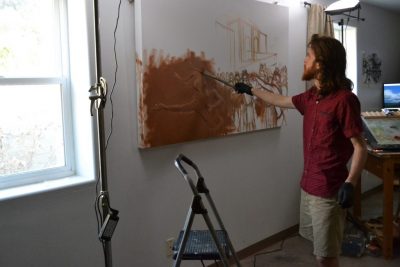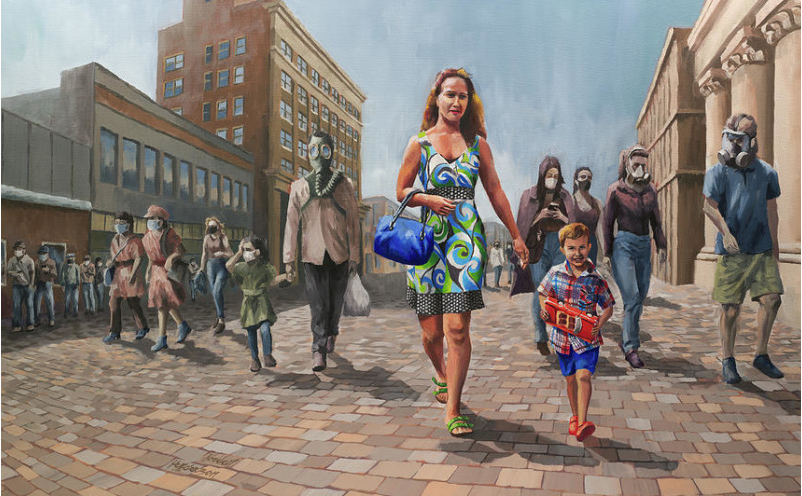Painter Opposes Covid “New Normal” Nonsense Without Sacrificing His Artistic Aspirations

“I believe that opposing what is wrong and furthering what is right is a moral imperative; and that it is my responsibility to do so in direct proportion to the power I posses at the time,” painter Jordan Henderson told me in a recent interview.
“So when the current contrived crisis and all the medical fraud and social engineering began to unfold, I knew that I should oppose it. I wanted to oppose it. But, I cannot abandon my art. In other words, I do not have time to be an activist.”
Whether we are a painter, a musician or a plumber I think we can all relate to this dilemma: Doing what we love versus fighting for our freedom to continue doing what we love.
John Adams once wrote a letter to his wife saying that he “must study politics and war” so that their grandchildren would have the freedom to “study painting, poetry, music, architecture, statuary, tapestry and porcelain.”
However, as Henderson has discovered, we still possess enough freedom that the two need not be in conflict. Instead of abandoning his art, he made his art an instrument of change:
“For some reason at least two months passed before I conceptualized the painting Sanity, Her Son, and the Credulous,” said Henderson. “This sort of painting means that I can continue my pursuit of artistic exploration while speaking out against this tyranny through an especially interesting medium. As obvious as this direction seems, it was an epiphany, almost unreal, because effectively it means having your cake and eating it too.”
Some people are meant to be full-blown activists: Journalists like James Corbett or Dan Dicks; or even a few good politicians like Randy Hillier, Sara Cunial or Herbert Kickl.
Yet others, like Henderson, are full-blown artists, who can change the world not with journalism and politics, but with creativity and metaphor — much like Mark Childress said that To Kill a Mockingbird impacted the civil rights movement “in the way that any number of treatises could never do, because it was popular art…” (I hope to do the same with my novel, The Brave New Normal: A Dsytopian Love Story.)
But such innovations are not limited to artists. Look at what a country health food store did to fight their masking bylaws. Or what my wife is doing to stop forced masking at our local hospital. As I explain in my article, The ONE Thing You Can Do to Stop the Nutty New Normal you need not become a Mahatma Gandhi to be the change you want to see in the (new normal) world. No contribution is too small.
“If you think you are too small to make a difference,” says the Dalai Lama, “try sleeping in a room with a mosquito.”
One simple way to be a pesky a mosquito on the neck of the Corona World Order is to purchase prints of Jordan Henderson’s anti-masking painting. Give copies to friends and family for Christmas. Order a stack of the greeting cards, write a friendly note, stuff them with an anti-masking article or study, and send them to your government representatives, your mayor, police chief and leaders in your community. You’ll be supporting Henderson’s artivism while using a moving visual image to awaken people to the tyrannical and dehumanizing agenda being force upon us.
*
Note to readers: please click the share buttons above or below. Forward this article to your email lists. Crosspost on your blog site, internet forums. etc.
John C. A. Manley has spent over a decade ghostwriting for medical doctors, as well as naturopaths, chiropractors and Ayurvedic physicians. He publishes the COVID-19(84) Red Pill Briefs – an email-based newsletter dedicated to preventing the governments of the world from using an exaggerated pandemic as an excuse to violate our freedom, health, privacy, livelihood and humanity. He is also writing a novel, Brave New Normal: A Dystopian Love Story. Visit his website at: MuchAdoAboutCorona.ca. He is a frequent contributor to Global Research.
All images in this article are from the author; featured image: Artists Jordan Henderson establishing a composition in his studio in Dayton, Washington.
*** This article has been archived for your research. The original version from Global Research can be found here ***



